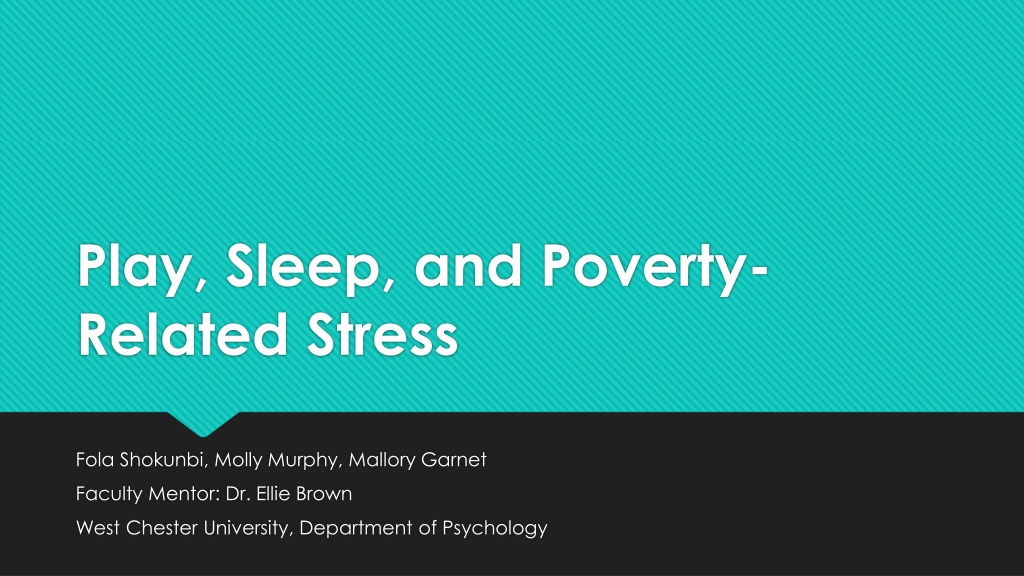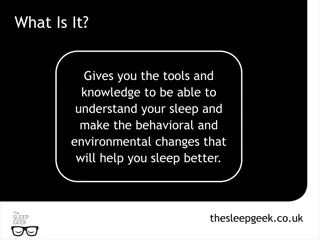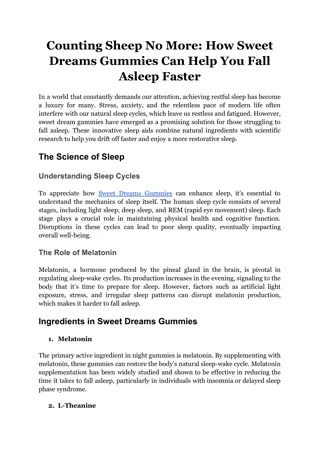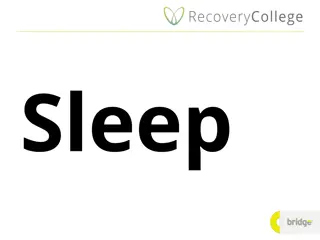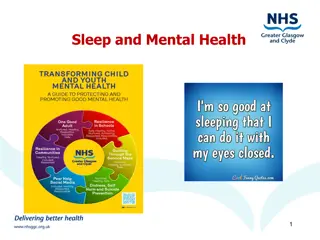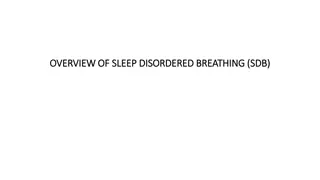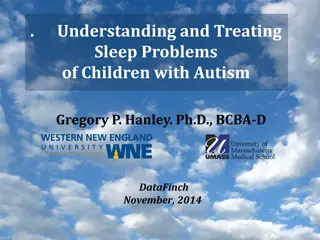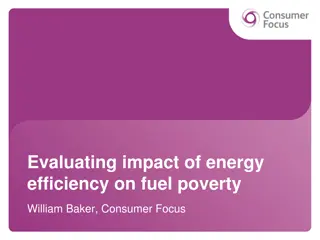Understanding the Impact of Poverty-Related Stress on Children's Play and Sleep
This research project explores how poverty-related stress affects children's play and sleep patterns. The study aims to understand the role of positive parenting in mitigating stress levels and promoting healthy development in children facing economic hardship. Through interviews with primary caregivers of children attending Head Start preschool, the study investigates daily routines and their impact on stress levels. The findings highlight the importance of structured play experiences and quality sleep in enhancing cognitive performance and emotion regulation among children in poverty.
Download Presentation

Please find below an Image/Link to download the presentation.
The content on the website is provided AS IS for your information and personal use only. It may not be sold, licensed, or shared on other websites without obtaining consent from the author. Download presentation by click this link. If you encounter any issues during the download, it is possible that the publisher has removed the file from their server.
E N D
Presentation Transcript
Play, Sleep, and Poverty- Related Stress Fola Shokunbi, Molly Murphy, Mallory Garnet Faculty Mentor: Dr. Ellie Brown West Chester University, Department of Psychology
Bronfenbrenners Model Understanding an individual s context of living Five Nested Categories Microsystem Mesosystem Exosystem Macrosystem Chronosystem
Overview Poverty circumstances tax physiological systems that respond to stress (Lupien, King, Meany, McEwen 2001; Blair et al 2011) as well as the brain areas influenced by stress hormones, such as the prefrontal cortex (Hanson et al 2013, Hair et al 2015; Noble et al 2015; Blair & Raver 2016) Positive parenting may provide some protection (Blair and Raver 2016) Present study uses daily interview methodology to probe how parent might structure children's days to promote lower stress levels in the context of poverty
Parenting, defined as, responsive caregiving, including creation of stimulating and rewarding environments has effects including: Improved effortful control and emotion regulation (Neppl et al 2020) Reduction of cortisol levels in children being raised in poverty Facilitation of play experience can make a difference Play provides opportunities for children to acquire and develop executive functioning and emotion regulation skills Structuring of sleep matters as well Sleep quality can have both immediate and lasting effects on development Children with more fragmented sleep patterns show higher levels of cortisol at waking (Scher et al 2010) Sleep quality can moderate SES effects on cognitive performance (Buckhalt 2007)
Methods Participants were 139 children who attended a Head Start preschool in a large Mid-Atlantic US city and their primary caregivers. The mean age of the children was 4 years, 2.08 months (SD = 6.81 months). 48.9% were identified as female, and 51.1% as male. 52.6% identified as Black/African American, 16.6% as Latino/Hispanic American, 8.6% as Asian American and 22.3% as White/European American. Almost 100% of participants faced economic hardship, with their income-to-needs ratios falling below 2X the federal threshold for poverty status. Primary caregivers completed initial demographic interviews as well as follow-up parent interviews They were conducted over the telephone by trained research assistants in order to collect information about daily routines, on 10 different days across two weeks.
Questions were asked about the prior days activities. Parents were asked what their children did during the hours they were home together and were asked what time they went to sleep. Child activities were coded by trained research assistants as falling into one of five categories: play (e.g., blocks, dolls, sports, drawing) leisure (e.g., TV, music listening, eating) socializing (e.g., talking with someone in person, on the phone, or virtually) chores (e.g., setting the table, taking a bath) learning (e.g., reading a book, practicing writing). Scores were coded as a proportion of the total time the parent and child were home together and were averaged across the 10 days of the interview. Child cortisol was measured via samples of saliva collected at 9am, just following preschool drop-off and prior to breakfast. Collection, storage, and analysis was conducted according to standard procedures (Blair et al., 2005).
Results Table 1 Table 2 shows a zero-order correlational analysis Out of all the activity categories in the study, more playtime is related to lower levels of the stress hormone, cortisol. A later bedtime related to higher levels of cortisol. shows a regression analysis that included key demographic controls Playtime and bedtime explained unique variance in cortisol.
Table 1 Variables 1 2 3 4 5 6 7 8 9 10 11 1. Age 2. Sex -.029 3. Race/ethnicity .002 .149 4. Family income -.007 -.137 .175* 5. Chores -.154 -.193 -.202 -.098 6. Leisure -.016 .092 .126 .04 -.539** 7. Socializing .004 .027 -.06 -.034 -.123 .108 8. Learning .074 .049 .039 .036 .009 -.028 -.233* 9. Playtime -.168 .299** -.078 -.226* -.193 .038 .115 .042 10. Bedtime .043 -.082 -.049 .047 -.329** .027 .039 .053 -.04 11. Cortisol -.049 .068 .08 .004 -.09 .011 .150 -.132 -.271* .331** Descriptive Statistics for Child Demographics, Daily Activities, and Cortisol (N=139) Note. Child age is coded in months. Child sex and race/ethnicity are coded dichotomously (1 = male and minority group member, respectively). Family income represents the income-to-needs ratio based on federal guidelines. Cortisol is measured in micrograms per deciliter ( g/dL). *p < .05, **p < .01.
Results: Table 2 Model 1 Model 2 Variable B SE B B SE B Age -.001 .004 -.045 -.003 .003 -.096 Sex .001 .054 .002 .039 .049 .098 Race/ethnicity .001 .061 .002 .009 .055 .02 Family income -.014 .035 -.053 -.034 .032 -.133 Playtime -.001 .000 -.36* Bedtime -.077 .027 .33** R2 .003 .094 F for change in R2 .082 2.905*** Results of Hierarchical Regression for Child Cortisol (N = 139) *p = .005, **p = .006, *** p = .001.
Discussion Results suggest both playtime and sleep time matter for the stress levels of children facing economic hardship Interventions can be implemented at different levels of the Ecological Model Microsystem Parents might facilitate play experiences with children during time together and make sure they have adequate amounts of sleep Play-based interventions in school might supplement and help develop ones learned at home
Mesosystem Schools might help facilitate implementation of play and sleep interventions at home or help reduce parental stress that limits opportunities for play at home (Hamden-Thoompson & Galindo 2017) Macrosystem Policy implications concern the importance of play and sleep for children facing economic hardship Chronosystem Supportive interventions over time may benefit children raised in poverty, providing boosts to academic achievement, reductions in instances of substance abuse, and overall better outcomes (Verner 2018, Negr o et al 2014, Roetman et al 2019)
Limitations This is an initial study using novel methodology to examine an understudied area Potential unmeasured confounding variables that explain these relations, and future studies are needed
Thank you!
